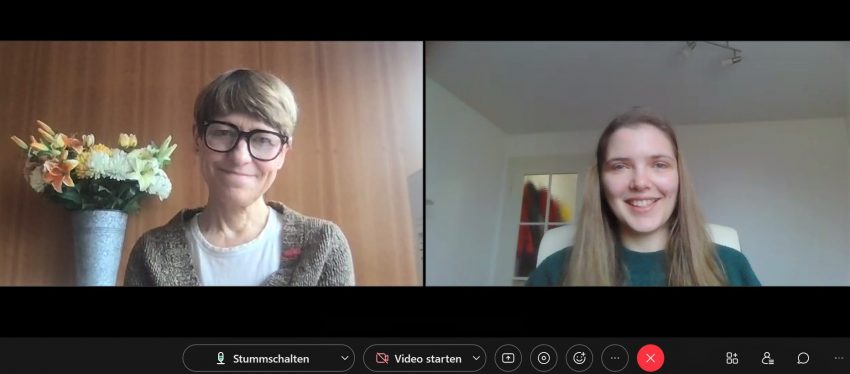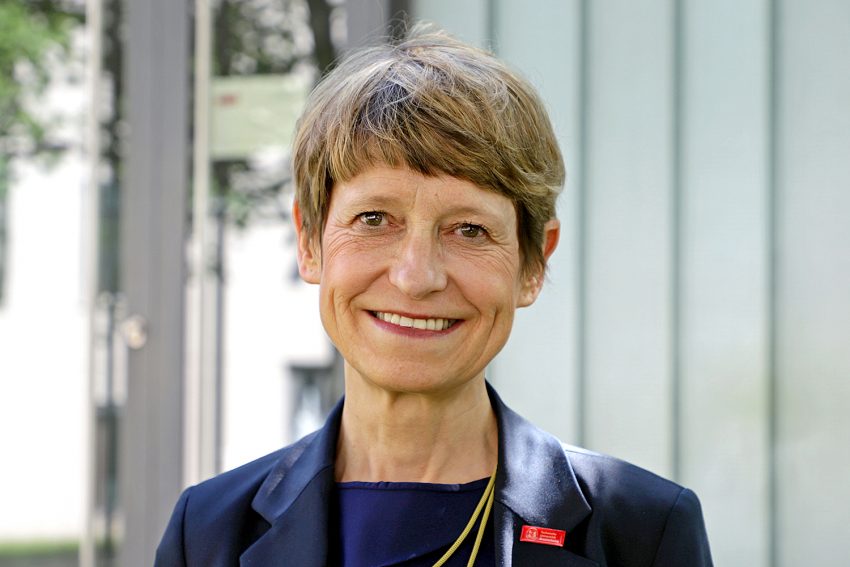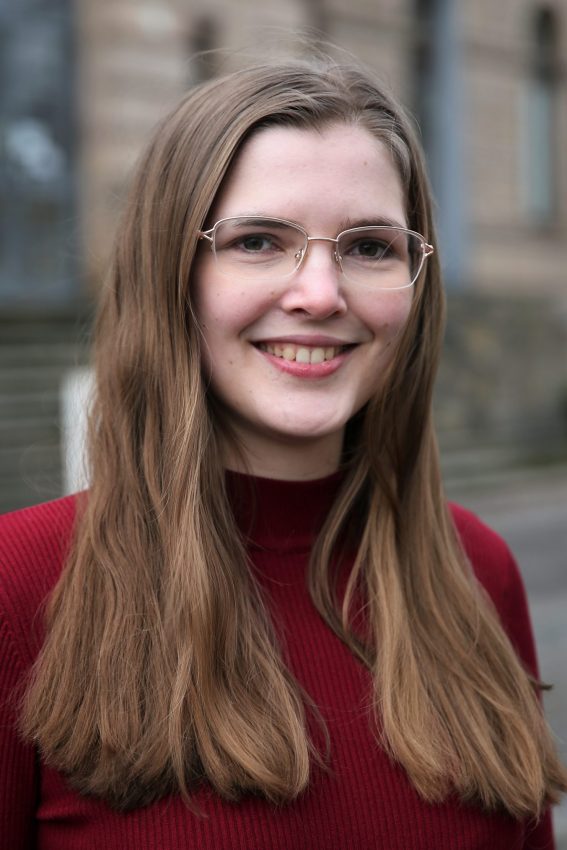“Teaching in English has many aspects that are enormously important for TU Braunschweig” TU President Angela Ittel and StuPA President Sabrina Ammann in interview
TU Braunschweig started the winter semester 2021/22 with new study programmes in English, a new online directory making it easier to find courses available in English and an online symposium on the topic of international teaching. The topic of multilingual teaching is more present than ever at the university. This is reason enough to talk to the President of TU Braunschweig, Professor Angela Ittel, and Sabrina Ammann, President of the Student Parliament (StuPa) about the status quo and to venture a look into the future.

Prof. Angela Ittel and Sabrina Ammann agree: English-language teaching plays an important role for the future of TU Braunschweig. Photo credit: Henrike Hoy/TU Braunschweig
What were your own experiences with teaching and learning in English during your studies?
Prof. Angela Ittel:
“I completed my entire degree in the USA and then did my doctorate there. For me, it was a change to teach in German when I returned to Germany. But of course the experience I gained in the USA I brought to TU Berlin, first as a lecturer and later as Vice-President, and I would now like to implent these aspects to TU Braunschweig.”
Sabrina Ammann:
“I study mathematics at TU Braunschweig and unfortunately I have not yet had much experience with learning in English, mainly because of my ‘specialisation’ in my degree programme. But now, there are already some courses in English, also due to the new study programme Data Science. In addition to my studies, I listen to many specialist lectures in English and have organised some excursions to other European countries, where of course English was spoken.”
What role does the topic of teaching in English play today for a university such as TU Braunschweig?
Prof. Angela Ittel:
“Teaching in English has many different aspects that are extremely important for TU Braunschweig: On the one hand it enables us to offer an attractive range of courses to a larger number of students. One goal in this context is to become more attractive for international students. But teaching in English is also important for German students, because we want to provide a global education that will later on give them confidence in English as a technical language on the job market. English-language courses also play an important role for exchange opportunities, because when students from abroad come to Germany for a semester, they often bring with them little knowledge of German and want to study in English as much as possible. With a good range of English-language teaching, we can achieve several goals at the same time.
Sabrina Ammann:
“A good example is Scandinavian universities. If you want to spend an Erasmus semester there, it’s not a problem at all to take courses in English, meaning you can get enough credits even during the semester abroad.”
Prof. Angela Ittel:
“Correct. And especially in order to maintain and expand the numerous exchange opportunities for our students, it is important that we expand our English-language courses. Furthermore, I would like to see more teachers and staff taking advantage of the opportunity to gain experience abroad, for example through the Erasmus Staff Programme.”
What is the student body’s opinion on the topic of teaching in English?
Sabrina Ammann:
“My impression is that the students want to gain more experience with English teaching and are very open to the topic, especially the students in the higher semesters. For Bachelor’s students who are just beginning their studies, the focus is naturally first on approaching their own subject, understanding technical terms and learning how to work scientifically. At the moment, many of them still want to do this in their mother tongue. Learning in a foreign language becomes relevant for most students towards the end of their Bachelor’s degree or in their Master’s.”
Critics of teaching in English often complain that German is being displaced as the language of science when universities increasingly teach in English. What do you say to them?
Sabrina Ammann:
“From my point of view, the research market is already dominated not by German but by English. I therefore find it difficult to argue that English is displacing German as the language of science, when German has actually never really been THE language of science in most research fields. So I don’t share these concerns about English-language teaching.”
Prof. Angela Ittel:
“I would like to add here that we are of course not only training for research, but also for the international job market. Our students should have the opportunity to work in other countries or in international teams in Germany later on and to become familiarized with important instruments of international exchange. In my view, this is extremely important in the education of students. That’s why I also wish that we could bring many more international teachers to TU Braunschweig to provide more different teaching perspectives. This broadens the horizon and is an absolutely necessary competence for the future.”
What is the current status at TU Braunschweig with regard to the topic of teaching in English?
Prof. Angela Ittel:
“We are not starting from scratch, that is important for me to emphasise. When I took up my post at TU Braunschweig, I was very pleased to see that there are many initiatives here to expand the English-language teaching offers. Furthermore, I think that the generational change in teaching staff will mean that we can offer much more English-language teaching in the future.”
What is the significance of teaching in English for the university’s overall internationalisation process?
Prof. Angela Ittel:
“It must be clear to all of us that we are always in competition with other universities – for the best students, researchers and staff. We will lose this competition if we do not expand the teaching offers of courses in English. It is also clear that TU Braunschweig must become more internationally visible and international teaching offers contributes enormously to this.”
How does TU Braunschweig support German-speaking lecturers and students who want to teach or study in English?
Sabrina Ammann:
“I can only recommend that all students take subject-specific English courses at the Language Centre, for example. However the many intercultural offers at the university, such as the tandem programme or buddy programmes for international students, also help to improve one’s English skills. You should take advantage of that, because that makes it easier to get started with English language courses or going abroad, as well as to give presentations in English.”
Prof. Angela Ittel:
“For lecturers who want to offer English-language courses or develop modules or entire degree programmes in English, there is a great offer of support at the Project House. There is also support for the translation of teaching materials. The English coaching programme at the International House, which supports students and lecturers in presenting and teaching in English, is still very new. In the second quarter of 2022, we will also set up a central translation service at the International House.”
What are the next steps and goals?
Prof. Angela Ittel:
“We will be the first university in Germany to have our internationalisation process re-examined by the German Rectors’ Conference this year as part of the Re-Audit². In this context we will identify recommendations for action and potential and English-language teaching will certainly play an important role. In addition, I would like to approach the topic systematically and work out target figures that will precisely define the proportion of English-language teaching at TU Braunschweig in the future. Put into perspective, there should be at least one English-language Master’s programme at every faculty and, ideally a Bachelor’s programme as well. That would put us on a solid footing.”
How do you envision teaching at TU Braunschweig in 2030?
Sabrina Ammann:
“I find it a bit difficult to make a prediction there, but I could imagine that teaching in 2030 will be more of a hybrid teaching and that it will be much more normal that we speak English with each other in our studies.”
Prof. Angela Ittel:
“I agree with that. The digitalisation of teaching is also extremely important for its internationalisation, therefore we need to develop further in this area by 2030. I imagine that we will have achieved a significant increase in English-language teaching by then. Even beyond teaching, I believe that in 2030 the integration of the topic of internationalisation into all areas of the university will have been successfully implemented and that the mindshift towards a global university will have taken place.”
The interview was conducted by Henrike Hoy (International House, TU Braunschweig).


